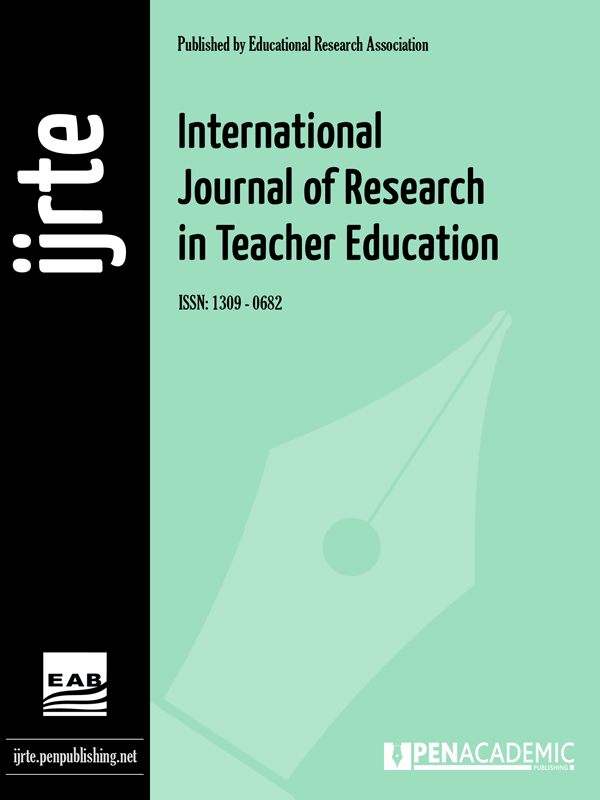Original article | International Journal of Research in Teacher Education 2023, Vol. 14(2) 1-18
Examining Perceptions of Turkish Language and Literature Teacher Candidates with Pedagogical Formation towards Drama Method
Ömer Tuğrul Kara
pp. 1 - 18 | DOI: https://doi.org/10.29329/ijrte.2023.566.1 | Manu. Number: MANU-2305-27-0007.R1
Published online: June 27, 2023 | Number of Views: 65 | Number of Download: 204
Abstract
The purpose of this research is to reveal the perceptions of Turkish language and literature teacher candidates, who receive pedagogical formation education at Çukurova University, about the drama method through metaphors. In the study, 146 Turkish language and literature teacher candidates who received pedagogical formation training at Çukurova University in the 2016-2017 academic year were asked to fill in the blanks in the sentence “Drama method is like … because …”. The data of the research was obtained with this questionnaire. Content analysis technique was used while analyzing the data. The metaphors obtained in the research are divided into different categories. The sub-classifications with the highest frequency in the findings of the study; drama reflects life, it has animations, that it is relaxing, that it provides knowledge and skills, and that it reveals creativity. As a result, it has been tried to obtain clues about how the drama method is perceived by the Turkish language and literature teacher candidates who received pedagogy education and how they will use this method in their professional life. In this context, it has been concluded that the perceptions of Turkish language and literature teacher candidates regarding the concept of "drama" varies.
Keywords: Drama method, pedagogical formation, metaphor, Çukurova University, Turkish language and literature teacher candidates
| How to Cite this Article? |
|---|
|
APA 6th edition Harvard Chicago 16th edition |
| References |
|---|
|
Adıgüzel, Ö. (2009). Determination and comparison of German and Turkish participants’ perceptions of creative drama through the metaphor method. Eğitim ve Bilim, 34(153), 25-37. Annarella, L. A. (1992). Creative drama in the classroom [Viewpoints]. Retrieved July 18, 2018 from https://files.eric.ed.gov/fulltext/ED391206.pdf Aydoğdu, E. (2008). İlköğretim okullarındaki öğrenci ve öğretmenlerin sahip oldukları okul algıları ile ideal okul algılarının metaforlar (mecazlar) yardımıyla analizi. Yayınlanmamış yüksek lisans tezi. Eskişehir: Osmangazi Üniversitesi. Balcı, A. (2003). Eğitim örgütlerine yeni bakış açıları. Kuram ve Uygulamada Eğitim Yönetimi, 33, 26-61. Çelenk, S. (1988). Eğitim yüksekokulu öğrencilerinin öğretmenlik mesleğine ilişkin tutumları. Yayınlanmamış yüksek lisans tezi, Selçuk Üniversitesi Sosyal Bilimler Enstitüsü, Konya. Çepni, O. & Aydın, F. (2015). Coğrafya öğretmen adaylarının öğretmenlik uygulaması dersi kapsamında karşılaştığı sorunlar ve çözüm önerileri. Türkiye Sosyal Araştırmalar Dergisi, 2, 285-304. Epçaçan, C. (2013). Opinions of class and subject matter teachers and candidate teachers on the effectiveness of creative drama in teaching activities. Educational Research and Reviews, 8(14), 1064-1075. Ferreira, M. M., Smith, G. R. & Bosworth, K. (2001). Metaphors as images of school culture. Journal of School Leadership, 11(2), 78-97. Girmen, P. (2007). İlköğretim öğrencilerinin konuşma ve yazma sürecinde metaforlardan yararlanma durumları. Yayımlanmamış doktora tezi. Eğitim Bilimleri Enstitüsü, Eskişehir: Anadolu Üniversitesi. Glasser, W. (1996). Then and now. The theory of choice. Learning, 25(3), 20-22. Güler, M. & Kandemir, Ş. (2015). Öğretmenlerin drama yöntemine yönelik görüşleri ve öz yeterlik düzeyleri. Ahi Evran Üniversitesi Kırşehir Eğitim Fakültesi Dergisi (KEFAD), 16 (1), 111-130. Gündoğan, A., Arı, M. & Gönen, M. (2013). The effect of drama on the creative imagination of children in different age groups. Hacettepe University Journal of Education, 28(2), 206-220. Gündoğan, A. & Ergenekon, E. (2019). “Drama is life” a metaphor analysis study. Kastamonu Education Journal, 27(4), 1777-1786. Kara, Ö. T. (2010). Dramayla öykü oluşturma yönteminin ilköğretim ikinci kademe Türkçe öğretimine etkisi, Doktora tezi, Selçuk Üniversitesi, Eğitim Bilimleri Enstitüsü, Konya. Karadağ, E. & Çalışkan, N. (2014). Eğitimde drama: Teorik temelleri ve uygulama örnekleri. Ankara: Anı Yayıncılık. Kereks, J., & King, P. K. (2010). The king’s carpet: Drama play in teacher education. International Journal of Instruction, 3(1), 39-60. Merriam, S. B. (2018). A guide to qualitative research-design and application (Trans. Ed. Selahattin Turan). Ankara: Nobel Yayıncılık. Miles, M. B. & Huberman, A. M. (1994). Qualitative data analysis: An expanded sourcebook. California: Sage Publications. Nutku, Ö. (1998). Dram sanatı. İstanbul: Kabalcı Yayınevi. Onur Sezer, G. & Bağçeli Kahraman, P. (2021). Temel eğitim öğretmen adaylarının dramaya ilişkin metaforları, Millî Eğitim, 50 (230), 509-533. Önder, A. (2002). Yaşayarak öğrenmek için eğitici drama. İstanbul: Epsilon Yayıncılık. Önder, A. (2003). Okul öncesi çocuklar için eğitici drama uygulamaları. İstanbul: Morpa Pinciotti, P. (1993). Creative drama and young children: The dramatic learning connection. Arts Education in Early Childhood, 94, 24-29. Saban, A. (2008). Okula ilişkin metaforlar. Kuram ve Uygulamada Eğitim Yönetimi, 55, 459-496. San, İ. (2006). Tiyatroya rağmen yaratıcı drama. Yaratıcı Drama Dergisi, 1(1), 6-15. Semerci, Ç. (2007). “Program geliştirme” kavramına ilişkin metaforlarla yeni ilköğretim programlarına farklı bir bakış. Cumhuriyet Üniversitesi Sosyal Bilimler Dergisi, 31 (2), 125-140. Şahin Kalyon, D. & Aksoy, P. (2017). Pre-service primary school teachers’ perceptions of the concept of drama: A metaphor study. SDU International Journal of Educational Studies,4(2), 110-126. Taş, A. M. (2013). Metaphors: The elementary school teacher candidates come up with relation to the concept of “drama”. Creative Education, 4(7), 440-445. Toivanena, T., Komulainena K. & Ruismäkia H. (2011) Drama education and improvisation as a resource of teacher student’s creativity. International Conference on Education and Educational Psychology (ICEEPSY 2010), Procedia Social and Behavioral Sciences, 12, 60–69. Türkçe Sözlük (2011). Ankara: Türk Dil Kurumu Yayınları. Yapıcı, M. & Yapıcı, Ş. (2013). Öğretmen adaylarının pedagojik formasyona ilişkin metaforları. Turkish Studies, Volume 8/8, 1421-1429. Yıldırım, A. & Şimşek, H. (2013). Sosyal bilimlerde nitel araştırma yöntemleri (9. bs.). Ankara: Seçkin Yayınları Yücel Toy, B. (2012). Öğretmen eğitiminde formasyon derslerinin drama yöntemi ile işlenişine ilişkin öğretmen adaylarının görüşleri: Gelişim ve öğrenme dersi örneği. International Journal of New Trends in Arts, Sports & Science Education, 1 (1), 125-136. Yüksel, A., Akyol, T. & Şenol, B. (2016). Determining the perceptions of prospective teachers regarding drama. International Journal of Social Science, 53, 413-432.
|


